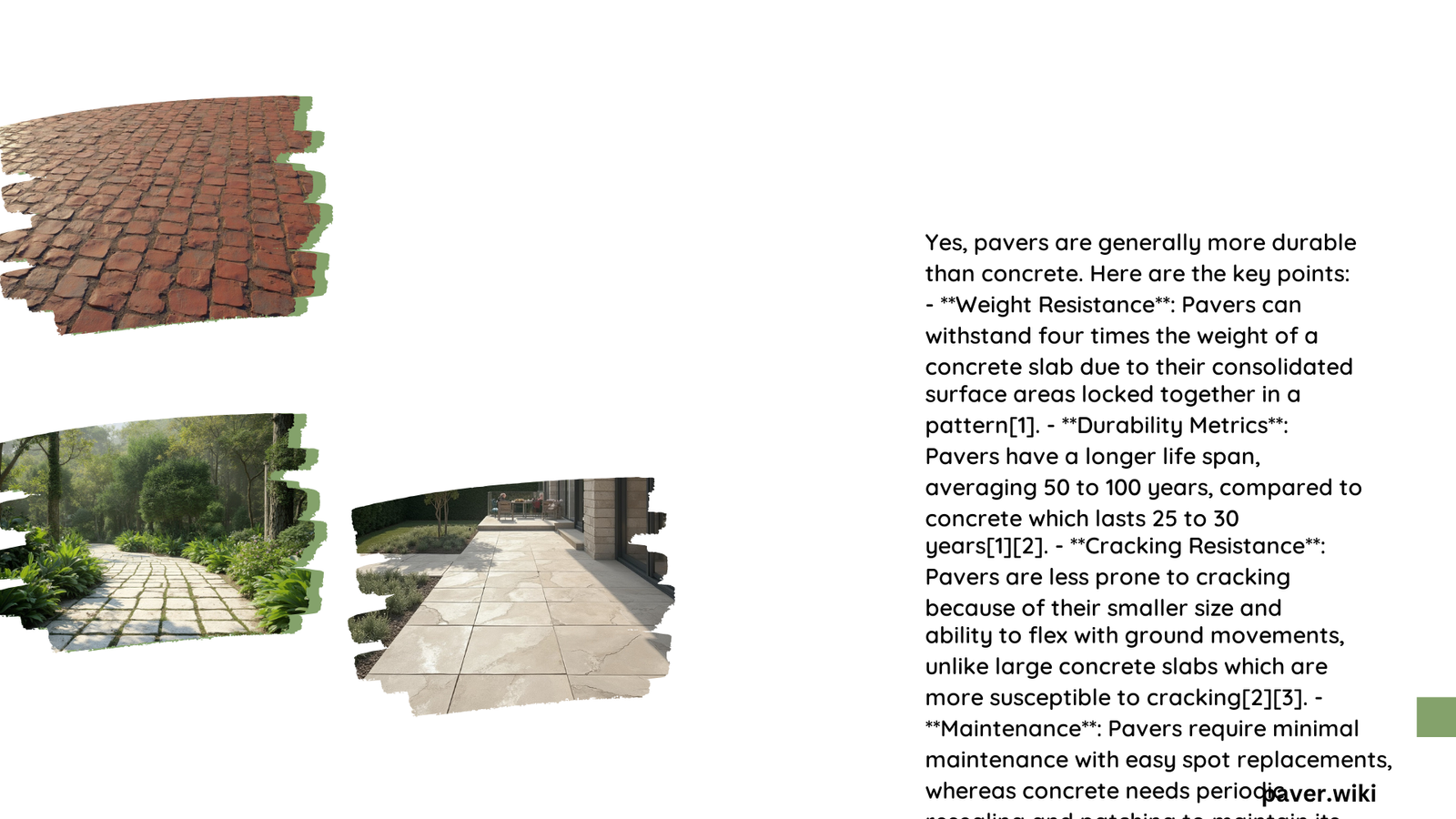Pavers and concrete are popular hardscaping materials, but homeowners and contractors often wonder about their long-term performance. When comparing durability, pavers demonstrate superior strength, crack resistance, and adaptability. With the ability to withstand higher pressure, handle temperature variations, and offer easier repairs, pavers consistently outperform traditional concrete in multiple critical durability metrics.
What Makes Pavers More Durable Than Concrete?
How Strong Are Concrete Pavers Compared to Concrete?
Concrete pavers represent a significant advancement in construction materials. Unlike standard poured concrete, these interlocking units offer remarkable structural integrity. Key strength characteristics include:
-
Compressive Strength:
| Material | Compressive Strength (PSI) |
|———-|—————————-|
| Standard Concrete | 3,000 |
| Concrete Pavers | 8,000+ | -
Load-Bearing Capacity: Pavers can handle four times more weight before experiencing structural failure compared to traditional concrete slabs.
Why Do Pavers Resist Cracking Better?
The unique design of pavers provides exceptional crack resistance through several mechanisms:
- Flexible Interlocking System
- Individual units can move independently
- Distributes stress across multiple pavers
-
Prevents large-scale structural failures
-
Expansion and Contraction Capabilities
- Allows natural movement with temperature changes
- Reduces internal stress buildup
- Minimizes risk of catastrophic cracking
What Maintenance Advantages Do Pavers Offer?
Maintenance plays a crucial role in long-term durability. Pavers provide significant advantages:
- Repair Simplicity:
- Replace individual damaged pavers
- No need for complete surface reconstruction
-
Cost-effective maintenance approach
-
Cleaning and Preservation:
- Easy surface cleaning
- Periodic sealing enhances longevity
- Resistant to staining and environmental degradation
How Long Will Pavers Last?
Longevity is a critical durability factor:
- Concrete Pavers Lifespan: 50-100 years
- Poured Concrete Lifespan: 25-30 years
What Environmental Factors Impact Durability?
Pavers excel in challenging environmental conditions:
- Freeze-Thaw Resistance
- Ground Movement Adaptation
- Temperature Fluctuation Tolerance
Are All Pavers Equally Durable?
Different paver materials offer varying durability levels:
- Concrete Pavers
- Highest overall durability
- Excellent wear resistance
-
Superior load-bearing capacity
-
Clay Pavers
- Moderate durability
- Aesthetic appeal
-
Slightly lower performance
-
Natural Stone Pavers
- High durability
- Premium appearance
- Variable performance based on stone type
Conclusion

While both pavers and concrete serve construction purposes, pavers consistently demonstrate superior durability. Their ability to withstand higher pressures, resist cracking, and offer easier maintenance makes them an excellent long-term investment for various applications.
Practical Recommendations
- Choose concrete pavers for high-traffic areas
- Consider environmental conditions
- Invest in professional installation
- Perform regular maintenance
Cost Considerations
- Initial installation: $10-$50 per square foot
- Long-term maintenance: Lower than traditional concrete
- Potential savings through reduced replacement costs
Reference:
– Titan Pavers Comparison Guide
– Install It Direct Paver Resources
– HomeAdvisor Paving Materials
